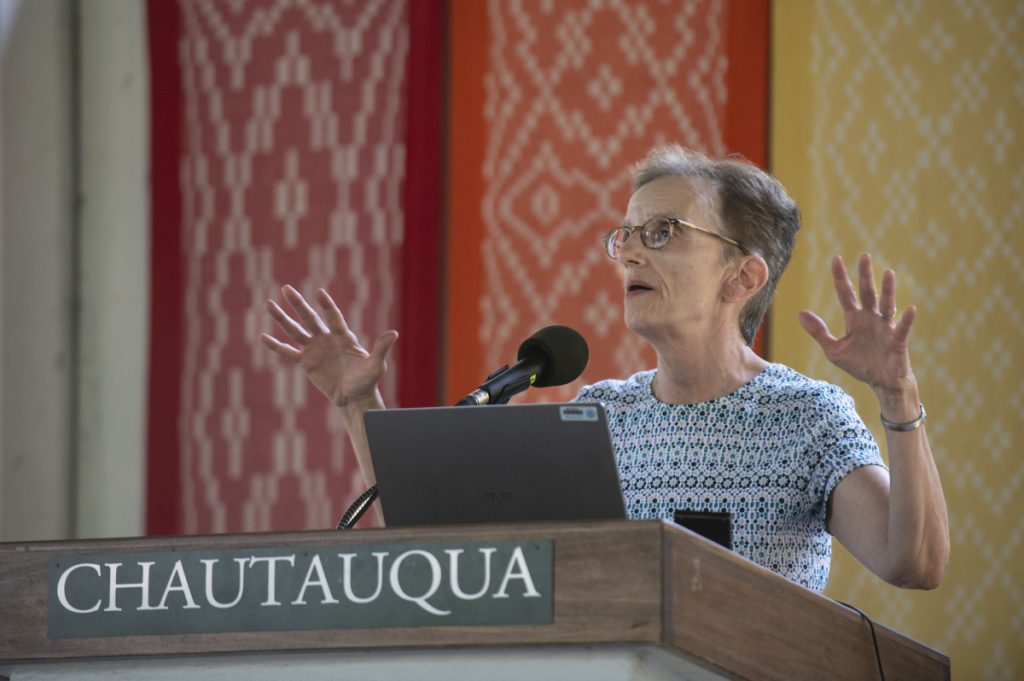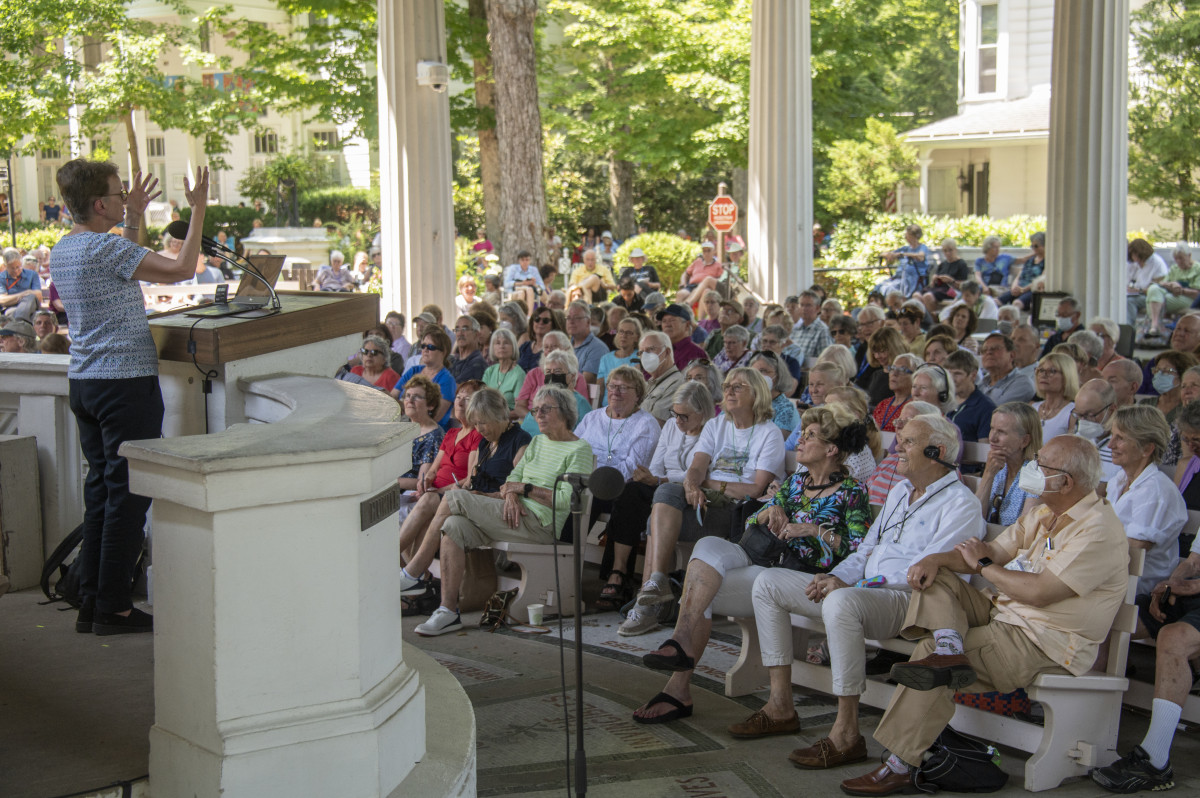Science, technology and all living beings evolve, yet religion has largely stayed the same for thousands of years. Sr. Ilia Delio, OSF, said that now is the time for a religious transformation.
Delio, a sister of the Franciscan Order, presented her lecture, “Infinite Matter, Infinite God: In Search of a New Myth,” this Tuesday, July 19, continuing the discussion of Week Four’s Interfaith Lecture Series theme “The Future of Being.”
As the author of over 20 books, Delio has received multiple accolades and honors for her writing. She is also a professor at Villanova University and holds the Josephine C. Connelly Endowed Chair in Theology.
Before becoming a sister, Delio worked as a research neuroscientist. This previous line of work has continued to fuel her scientific and religious interests.
“Both science and religion have an answer or a role to play in what we are becoming,” Delio said. “… And yet, we have had a difficult time bringing these two major pillars of knowledge into a unified way of knowing our one world, our one planet.”
Even though Delio has committed her life to religion, she recognized that religion has struggled to unite people in the 21st century. She attributes these shortcomings to religion’s inability to evolve in the face of new scientific discoveries.
“(The bond between religion and Greek mythology) worked in the 13th century. It worked maybe for the first 1,200 years of Christianity. It doesn’t quite work anymore,” Delio said. “And really, the problems began when Nicolaus Copernicus and others began to realize that the Earth is not stationary.”
Once science began to oppose scripture, the great divide between science and religion began to solidify.
“(Pierre) Teilhard de Chardin said, ‘The artificial separation between humans and cosmos is at the root of our contemporary moral confusion,’ ” Delio read. “That’s something to really think about — we have become radically separated from the world in which we live.”
Citing Alfred North Whitehead, Delio said that religion cannot become as powerful as it once was if it refuses to evolve and change in a similar way to science.

Once people began to understand that the universe is billions of years old, with human existence occupying a fragment of time in comparison, Delio said matter became understood as energy; quantum physics began to change the understanding of everything.
But as scientists were studying quantum physics, they discovered that in order for a realization to occur, humans must have a thought or a conscious decision, Delio said, and this began to raise the question: Is the human mind a part of matter?
“No matter what, we can’t talk about God apart from consciousness. We can’t talk about anything apart from consciousness,” she said.
With these new scientific revelations, humans realized how much they do not know about the interconnectedness of space, time and consciousness. Thus, the term “holism” was born.
“(Holism) means that we’re living in this world of deeply entangled fields of energy, fields within fields, so that the nature of the universe that is our home is undivided wholeness,” Delio said.
The scale of holism can be reduced down to prove that humans are a part of an indivisible whole, despite differing religions, nationalities and economic statuses, she said.
The same can be said for quantum entanglement — a theory that suggests that when two particles link, they will continue to affect each other even after they separate.
“Imagine that on the human level; once you’ve met, you’re entangled forever. Our thoughts are entangled, our actions are entangled,” Delio said. “… But entanglement means that physical reality is interconnected at the deepest levels.”
The entanglement theory counters the idea that humans are purely individual.
“We’re constantly interacting with matter, so it’s not that we humans have control over matter,” Delio said. “It is rather that matter allows a certain level of decision making on the humans, but matter has its own part to play in this.”
Humans are, as Delio said, the stuff of matter, but with a higher level of consciousness.
“Understanding matter in a new way … changes how we understand God, and changes how we understand ourselves,” she said. “And we haven’t grappled with this.”
Delio called for a new story, a new religious myth, to represent the current global community. God in Scripture is described as a supreme being, but Delio argued that God is not a tangible thing or a proper noun.
“God is the depth. … It’s, in a sense, what gets us up in the morning, what gives passion to our lives,” Delio said. “There’s something that’s pulling us onward. … God is existence itself.”
Other intangible concepts, such as time and spirit, are also related to matter. Delio said time is the movement of matter, while matter naturally moves toward spirit, and the concept of love could also be related to matter and energy.
“(Teilhard) says there’s an energy … that takes us beyond, constantly moving us forward, and it’s an energy that attracts us,” Delio said. “And (Teilhard) calls that energy — it’s a very simple thing — love. He says love is the core energy of the universe … and, therefore, he said, the physical structure of the universe is love.”
Continuing with Teilhard’s philosophy, Delio asked why humans do not have a God of evolution.
“(Evolution) is the best description of how biological life unfolds and complexifies. … We’re living in an open system of biological life; given enough time and the right conditions, something new is forming up ahead,” she said. “We can’t keep importing the ancient god of the Israelites and the early Christians on to the 21st century. God is not changed, but God is showing up in a new way.”
Because evolution is a process that takes millions of years, from the development of single-celled organisms to complex, conscious beings, Delio said humans are the “whole evolutionary sweep of biological life and cosmic life now on the level of the thinking subject.”
Referring to the universe as “unfinished,” Delio said she believes evolution will continue to transform life through creative power and consciousness.
“Teilhard described evolution as the rise of consciousness. … We are this whole material world on a new level of self-thinking thought. Evolution becomes conscious of itself, which means we’re not the center of this universe, but we are the arrow,” Delio said. “It does matter how we choose. … The whole state of the Earth now is resting on where our minds are.”
Although many wonder and marvel at where humans came from, Delio argued that it is more important to question where humankind is headed. She hypothesized that humans are not only moving toward God, but they are entangled with God.
“Maybe we really make a difference to what God becomes, and God makes a difference to what we become,” Delio said. “So maybe it’s just not we and God, but God-world — that we’re becoming something whole together.”
Teilhard believed that God needs creation, or else something would be lacking in God’s own existence. He acknowledged that God is not a logical explanation, but rather a paradox of love or a mystery.
“Teilhard says evolution is not only the universe coming to be, it is God who is coming to be,” Delio said. “We have made it all about us, when maybe the story is more about God.”
While creation and suffering, according to Teilhard, are two sides of the same reality, their existence depicts what it means to live in an unfinished universe.
“Unless we have breakdown in evil, we will not know that power to transcend,” Delio said. “I’m not saying it’s a good or a necessity, but it’s part of … a striving for something more up ahead.”
Although humans possess the power to lead a Godly life, Delio feels that this potential is rarely accessed.
“We have an infinite capacity for Godly life, each person, but we never really tap into it,” she said. “We keep settling for the mediocre.”
Jesus’ existence can be interpreted as an instance when divine capacity was reached within one person. Delio said Jesus is a symbol of human, divine and cosmic existence becoming one.
Calling for a reconciliation of divine love, she said God needs humanity to grow whole and complete.
“We have a God gap in this culture, and we are filling it in with everything else but a living divine,” Delio said.
Technology is evolving faster than humans, but Delio said because technology advances consciousness, it should also advance humans’ God-beingness.
“Something new is breaking through, no doubt about it,” she said. “It’s breaking through whether or not we want it to. … The question is, what will break through? Will it be the end of us, or will it be a greater cohesion of what we are for this planet?”
Technology cannot be judged as good or bad on its own; its impact is dependent on how humans use it, Delio said. Technology, however, has the ability to increase human entanglement through interconnectedness.
“I think that kind of love that we’re calling for here is to recognize the entanglement of love,” Delio said. “It matters how we go about this world. It matters how we think about this world. It matters how we forgive. … So love and love to the point of tears, because love alone will bring about a new universe.”





